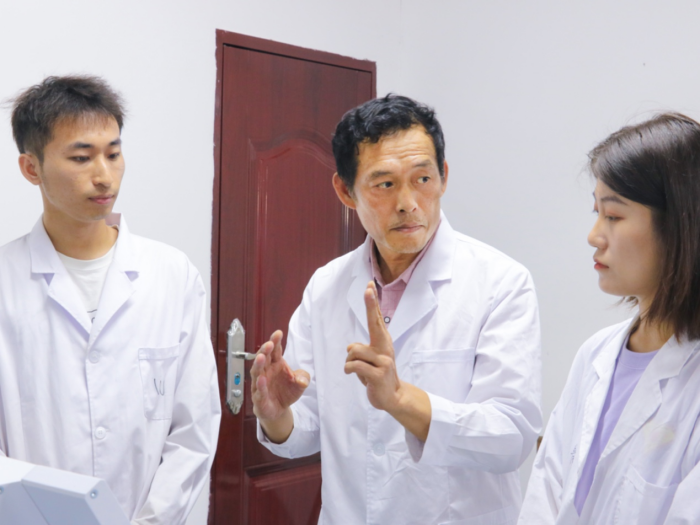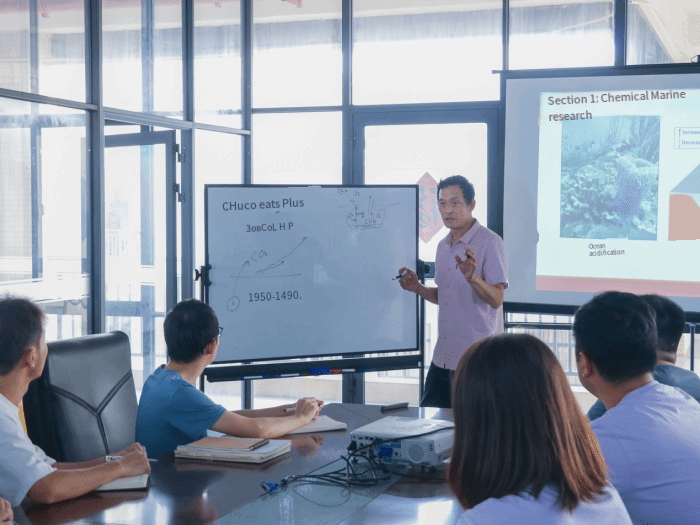In scientific research, he is serious and rigorous; in teaching, he devotes his heart and soul. Because he himself has gone through wind and rain on the road of scientific research, he always wants to hold up an umbrella for younger generation. He is Gao Shuji, Director of the State Key Laboratory of Marine Resource Utilization in South China Sea, Hainan University (hereinafter referred to as “SCS State Key Laboratory”).

Gao Shuji answering students’ questions Photo by Wan Ruizhi
Focus Scientific Research on the South China Sea
As a leader in the field of carbon and nitrogen biogeochemical cycles in China, Gao’s research area ranges from the atmosphere, watersheds, estuaries, marginal seas to open oceans. He has developed unique insights into the nitrogen processes in water bodies, particulate matter, and sediment-water interfaces, as well as the nitrogen-carbon coupling processes.
In 2020, at the age of 55, Gao Shuji changed his career path and came to Hainan University and took up the work of SCS State Key Laboratory, opening a new chapter in his life of research and teaching.
“In my eyes, Hainan Island and the South China Sea region are ‘diamond in the rough’, worthy of time and efforts of scientific and technological workers.” Gao said.
Although he has been working in the field of marine science, Gao’s research area is not fixed, but more and more refined. After he was appointed to SCS State Key Laboratory, he established the research area of marine chemistry and ecology, more and more young researchers joining his team to explore the vast South China Sea.
According to Gao, it is not always easy for marine science discipline, which relies on field observation and indoor analysis, to establish new laboratory platforms, produce high-quality data and publish research papers. The whole team has been striving to make progress.
Nevertheless, within a short period of time, Gao has led his team to publish 10 SCI papers in international mainstream journals with SCS State Key Laboratory as the corresponding unit, and introduced a business consulting team to build an incubation platform for the marine and terrestrial ecological economy industry to help transform scientific research results.

Gao Shuji shared knowledge with students. Photo by Wan Ruizhi
Adopt New Approaches to Interdisciplinary Teaching
The most important feature of marine science research is multidisciplinary. With the implementation of the National Marine Science Plan, the demand for interdisciplinary talents of marine science will become more and more urgent. The cultivation of interdisciplinary talents is not only the current trend of marine research, but also a more difficult task than the traditional discipline education.
How to use the most concise language to clearly explain the obscure technical questions or even interdisciplinary questions to students?
In class, Gao Shuji was using humorous language to explain the main reasons for the sinking of the Great Delta city: “The problem of groundwater storage and pollution can be understood in terms of spending and earning money. You see, groundwater storage is like a hundred yuan in your pocket. Pumping groundwater means spending money, and rainfall infiltration means earning money. If you only spend and don’t earn, then won’t the groundwater be gone?” In a few words, the complex source and sink problem for beginners is described with incomparable clarity.
Gao’s teaching style has attracted many fanboys and girls. “In Mr. Gao’s Isotope Application class, there is no place to sit if you are late.” “We couldn’t squeeze in, so we went to the office next door to watch the webcast.” The hour-long class is often extended to longer sessions with enthusiastic interaction between the teacher and students.
Inspire Young People to Keep Learning
“If a person likes one thing, he can stick to it all his life.” This is the credo that Gao Shuji has upheld in his scientific research life of more than 30 years, and it is also the principle that he has followed when helping students locate their research area of interest.
“When we first joined the group, Mr. Gao asked us to find and confirm our own interest first.” Students in Gao’s research group told the reporter, “With Mr. Gao’s encouragement, we follow our own interest and strengths, so we all have our own focus.”
At present, SCS State Key Laboratory and multiple schools of Hainan University, including Schools of Marine Sciences, Ecology and Environment, Information and Communication Engineering, Computer Science and Technology, have been jointly cultivating interdisciplinary marine technology talents at bachelor-master-doctorate levels. “In the second half of my life, I hope to expand the scientific research platform for SCS State Key Laboratory and become a ‘big umbrella’ for the growth of more young people here.” Gao said to the reporter.
Like many outstanding scientists in China, Gao Shuji is not only a pioneer in scientific research, but also a leader for younger generation. Only by passing on the torch can we reach new heights and look far ahead, provide new forces to build a powerful country in science and technology, and promote scientific and technological progress and national development.